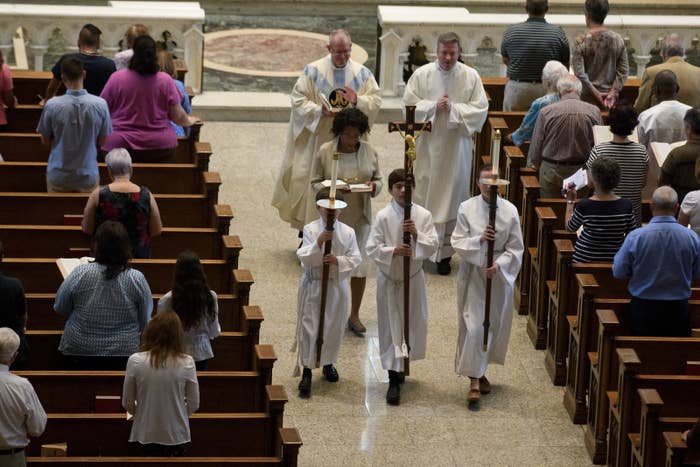
Ever since the Boston Globe’s 2002 revelations of widespread sexual abuse in the Catholic Archdiocese of Boston, a wave of lawsuits have been filed against dioceses around the nation. The goal of these cases was to get justice for the physical and emotional suffering endured by victims of abuse and to reform the child protection practices of the church.
In most states, however, the church does not need to be the least bit concerned about being sued by abuse survivors or paying even a nickel for the devastation wrought by its criminal behavior. Firstly, it knows most victims of abuse will never reveal or report it. But more importantly, even if they do come forward, in all but a handful of states the justice system unfortunately operates to protect the church from being sued in the first place.
Most states, like New York and Pennsylvania, have draconian statutes of limitations that prevent a person from suing unless they do so within a few years of being abused. This means the system has no recourse for those who summon the courage to come forward years, and often decades, after the abuse took place — and keep in mind, the majority of people never report their abuse at all. And it is not only a victim’s embarrassment, confusion, and shame that prevents them from reporting. Church leaders, aware of their liability, have been repeatedly shown deliberately failing to disclose complaints against their own clergy to law enforcement and taking actions that stymie victims from reporting.
The Catholic Church has learned that through the civil litigation process, it can wear down the overwhelming majority of victims. Most survivors of clergy abuse understandably do not have the strength for the years-long protracted legal battle that it takes to ferret out the truth and take the case to a jury. And most survivors do not want to want to put themselves through the grueling litigation process because it requires them to relive the abuse over and over again; they also want to spare their families the pain of living through the public retelling of the human nightmare that was their childhood.
Dioceses understand and rely upon the fact that the civil justice system will protect them and their secrets. Typically after a period of prolonged litigation, the diocese has the victim in a position where settlement is almost guaranteed. And for the church, paying money is much preferred to revealing the whole sordid truth.
The result is a system that has enabled a powerful, influential institution to largely evade accountability over decades for its widespread crimes and misconduct. Civil attorneys have litigated against the Catholic Church for over 20 years, and collectively, our clients have received millions. But because 99.5% of these cases are resolved by settlement, the full truth of the church’s appalling behavior is rarely revealed.
The reality is that the civil justice system simply does not have the same ability as a grand jury to uncover the truth. The civil process provides the church with ample protections, from refusing to provide critical, revealing documents on the grounds of privacy or relevancy to narrowing the scope of questions that bishops and other church leaders can be asked during depositions. Victims’ attorneys have spent years banging our heads against the courthouse doors trying to obtain the secret documents that were acquired by the Pennsylvania grand jury, and which formed the foundation of its explosive revelations.
Grand juries are extremely effective at flushing out the truth in these types of situations, because at their very hearts, they are criminal investigative bodies. Where there are very limited legal avenues to holding large institutions accountable for their transgressions in civil cases, grand juries fulfill a critical function of protecting the public. This role affords them much broader power to subpoena both documents and testimony than that allowed by the discovery process in a civil litigation setting. For example, as seen in the Pennsylvania case, grand juries have the authority to demand bishops and other high-ranking church officials testify on a wide-ranging number of subjects that ordinarily never see the light of day. Unfortunately, despite the effectiveness of this critical investigative tool, it has rarely been used by state attorneys general or local district attorneys. Before the Pennsylvania grand jury report, only a precious few grand juries have ever been empaneled to explore the crimes of the Catholic Church.
The Pennsylvania grand jury has created such a volcanic public reaction solely because of the harsh truths it was able to uncover. The report is responsible for breathing new life into the movement to change the unjust and rigid statutes of limitations, which now prevent untold numbers of victims nationwide from obtaining the justice to which they are entitled.
Every Roman Catholic diocese and archdiocese must be held publicly accountable for their complicity in the sexual abuse of generations of children. These grand juries must be the voice of the untold thousands who were forced to remain silent, including those who went to their graves never revealing the crimes that ruined their lives. Now is the time for all state attorneys general and district attorneys to empanel grand juries to investigate the Roman Catholic dioceses in their jurisdictions. Victims deserve it and justice demands nothing less.
Paul Mones resides in Los Angeles and represents victims of sexual abuse throughout the nation.
